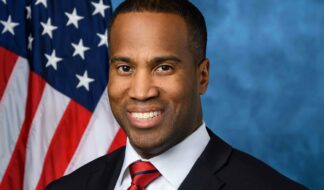My sister did the "Breast Cancer Three Day." When she first told me she was going to walk sixty miles over three days I thought she was crazy. I thought she was crazy not because I don't share her commitment to breast cancer awareness, but because she had trained with me in 2004 when I trained for my participation in a marathon for stroke research. It kicked my butt then, its four years later and she's my older sister! I knew she was very serious and would do it – that's my big sister.
Breast cancer is a life threatening reality for all women. One out of every eight women – that's 12.6 percent of all women – will be diagnosed with breast cancer in her lifetime. It's an equal opportunist affecting women regardless of class, social status, race, ethnicity or sexual orientation. Plus, men get it, too.
Lesbians have a higher incidence of certain risk factors known to be linked to breast cancer as many choose not to have children and delay or never become pregnant which is just one of the risk actors.
Although the number of breast cancer survivors is growing, it's still killing too many women. It's the most common cause of death from cancer amongst our Latina sisters and the second most common cause of death from cancer for all other women. We don't have to engage in any special, risky behavior. Just being a woman with a family history of breast cancer, delaying pregnancy until after 30 or never becoming pregnant, early menstruation, late menopause, use of oral contraceptives and daily consumption of alcohol puts us at risk.
I have had conversations with women who have delayed mammograms or don't do self examinations. They've said they are too young or cancer doesn't run in their family. If this is your excuse you're only fooling yourself. You are never too young to develop breast cancer. Just ask Christina Applegate, the star of "Samantha Who?" who at 36 was diagnosed with breast cancer and recently underwent a double mastectomy to rid it from her body. There have been survivors and deaths in women as young as 20.
There had been a history of breast cancer in Applegate's family so she was vigilant, but many women don't know if there is a family history. In the past, talking about your cancer was taboo. There was a stigma about it so many of our mothers, grandmothers and aunts did not talk about it. I heard an interview with one woman who, after she was diagnosed, discovered her grandmother had been a breast cancer survivor. She remembered her grandmother having a scar on her chest and always being careful to wearing clothing to keep her breasts covered – but no one discussed the cancer.
It's that dangerous secret in the family closet that can be putting you at risk, especially for our LGBT sisters whose communication with their biological families is often difficult or nonexistent. If they can't bring themselves to talk about your being gay, expecting a conversation about a family history of breast cancer might be totally impossible.
Not having breast cancer in your family history can also give you a false sense of security. My sister was not doing the 3-day in memory of a family member who had succumbed to breast cancer. She did it to find a cure for all women for this insidious disease. She did it to help research to fight and ultimately provide a cure for breast cancer She has two beautiful granddaughters, friends, co-workers – she did it for them. That's my big sister.
Thirty-five years ago, approximately 75 percent of women diagnosed with breast cancer survived their disease at least five years. Mastectomy was the only accepted surgical option for breast cancer treatment. Only one randomized trial of mammography for breast cancer screening had been conducted. Clinical investigation of combination chemotherapy, using multiple drugs with different mechanisms of action, and of hormonal therapy as post-surgical treatment for breast cancer was in its earliest stages.
Thanks to the efforts of the Susan G. Komen Foundation, institutes like the Barbara Ann Karmanos Cancer Center, events like the Breast Cancer Three Day and thousands of women just like my sister who took to the streets "just because," today nearly 90 percent of women diagnosed with breast cancer will survive their disease at least five years.
Combination chemotherapy has become standard in the treatment of women with early stage breast cancer. Hormonal therapy with SERMs is now standard in the treatment of women with estrogen receptor-positive breast cancer, both as therapy and in the treatment of advanced breast cancer. There are drug treatments being used to treat breast cancers that overproduce a protein called human epidermal growth factor receptor 2 or HER2. This protein is overproduced in about 20 percent of breast cancers.
The study of large groups of related individuals has led to the identification of several breast cancer susceptibility genes, including BRCA1, BRCA2, TP53, and PTEN/MMAC1. Women who carry mutations in these genes have a lifetime risk of breast cancer that is roughly 10 times greater than that of the general population. Progress towards a cure is being made every day but we must keep fighting, educating ourselves and our daughters and walking/running to raise funds for this much needed research.
I wasn't up for the 3-Day, but I support the race for the cure by making regular contributions, even buying breast cancer stamps for all my mail. I do monthly self-exams and have annual mammograms. I have made and encourage my friends to make lifestyle changes and choices as preventative measures. Healthy eating and regular exercise really contribute to breast cancer prevention.
But I was still at risk even though no one in my family has ever been diagnosed. I was concerned when my doctor told me they needed to redo my mammogram. I was annoyed that I had to take another day of to be squished and squeezed again. My concern turned to worry when after the first set of x-rays they called me back in for a second set, then a set on a different machine, then an ultrasound before I was taken to a little room to wait to speak with the radiologist.
I was shocked by the news that I would need a core biopsy and devastated when the results of that core biopsy meant I would have to have surgery. I had done all the right things, contributed to the Komen Foundation, ate right, exercised, had no family history but I had precancerous/cancerous cells in my left breast.
The good news is that because of advances in technology my lump was found three years earlier than it would have been with the old technology. I have friends, family and a partner who are there for me. And I have a big sister who did the Breast Cancer 3-day, walking 60 miles and never realizing that when she did it for a cure, she was doing it for me.









